高一英语外研必修4课件:Module1Grammar
外研 高中英语必修4Module1Grammar上课课件(25张)
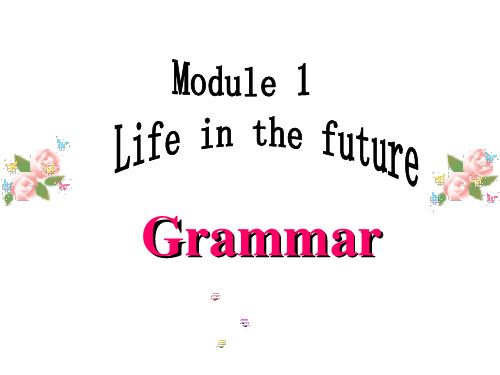
1. I like reading the novels ______ (write ) by Zhang Ailing. 2. The girl ______ (write) a letter in the study is my cousin. 3.There is something wrong with my car and I have to get it _______ (repair). 4. I want the doors of my new house ______ (paint) white. 5. There was a ________ (surprise) look on his face. 6. He was ______ (excite) at the good news. 7. The story was so ______ (move) that he was ______ (move) to tears.
过去分词作时间状语
When it is heated, ice will be changed into water.
=When heated, ice will be changed into water.
过去分词作条件状语
If I am compared with you, we still have a long way to go. =Compared with you, we still have a long way to go.
ቤተ መጻሕፍቲ ባይዱ
过去分词作状语 : 用作状语的过去分词通常来自及物动词。
过去分词用作状语时,修饰主句的谓语动 词,意义上相当于状语从句,表示时间/、 条件、原因、伴随状况等。过去分词作状 语, 前面往往可以加when, while, as if, as though。 一般来说,这种结构的逻辑主语 必须与主句的主语一致。 例如:
外研 高中英语必修4Module 1grammar 29页

4. If you run out of something you_____.
A. Leave it quickly B. Haven’t got any of it left
5. If something is on the way out it’s going to___.
A. Disappear
2. If something is free of charge it _____.
A. Doesn’t cost anything B. Is allowed by the law
3. For a start means _____.
A. At the beginning B. The first point is
外研 高中英语必修4Module 1grammar 29页( -精精品品PP)T课件 外研 高中英语必修4Module 1grammar 29页( -精精品品PP)T课件
外研 高中英语必修4Module 1grammar 29页( -精精品品PP)T课件 外研 高中英语必修4Module 1grammar 29页( -精精品品PP)T课件
The human body 4
外研 高中英语必修4Module 1grammar 29页(精品)
外研 高中英语必修4Module 1grammar 29页( -精精品品PP)T课件
Language 3
外研 高中英语必修4Module 1grammar 29页( -精精品品PP)T课件
外研 高中英语必修4Module 1grammar 29页( -精精品品PP)T课件
What will the city of the future look like?
高中英语 Module 1 (第2课时)Grammar课件 外研版必修4
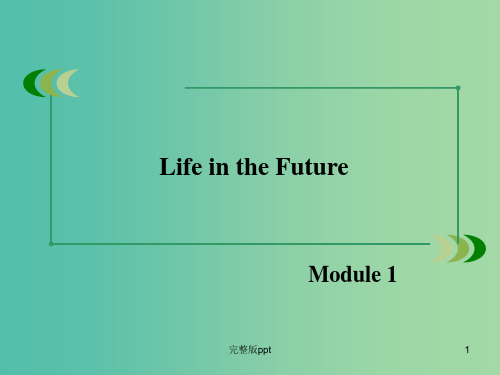
will be making
• _____you _________ here long? • ④如果我们继续这样完整努版pp力t 工作的话,我们会5
课内合作探究
完整版ppt
6
• 1.form v.形成;建立;构成
• ①These pieces of bamboo or wood were
tied together to form a book.
• 这些竹片或木片捆在一起就成了一本书。
• ②He has formed the habit of taking notes
in class.
• 他养成了上课记笔记的习惯。
• ③This verb has two past forms.
• 这个动词有两种过完去整版式 • form an idea 形成一种观点 • form a good habit 养成好习惯 • take the form of 采取……的形式 • in the form of 以……的形式 • be in form 状况良好 • be out of form 状况不佳
完整版ppt
16
• 一言辨异
• Li Ming held a party to celebrate his admission to Tsinghua University, and his friends congratulated him on it.
• 李明开了个聚会庆祝被清华大学录取了,他 的朋友们都祝贺他。
Life in the Future
Module 1
完整版ppt
1
第二课时 Grammar
Module 1
完整版ppt
2
1 课前自主预习
外研 高中英语必修4Module1Grammar(共36张PPT )
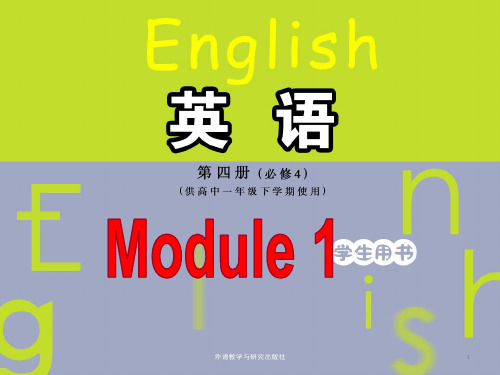
2020/6/16
6
3) 解释将要发生动作的原因。 e.g. I needn’t write to him, because I’ll be seeing him tomorrow.
4) 表示未来结果。 e.g. Stop the child or he’ll be falling over.
2020/6/16
2020/6/16
4
将来进行时的用法 1. 表示将来某一时刻或某一段时间里正
在进行的动作。
e.g. We will be seeing a fashion show this time tomorrow afternoon.
2020/6口语中), 使语言生动形象。用法如下: 1) 预料将要发生的动作或情况。 e.g. The train will be arriving soon. 2) 表示现已决定或安排将要做的事。 e.g. Doctor Smith will be giving another talk on family health at the same time next week.
e.g. We are having a party next week. We are meeting at 2:30 p.m. —Where are the boys? —They are coming. 4) be to do sth 表示将要发生的事或必然要做的事情。 e.g. They are to call me on Sunday. The book I’m writing is to come out soon.
2020/6/16
14
若使用将来进行时,可以说: We will be meeting him tomorrow / next year.
Module_1_Grammar课件_外研版必修4

2. (2013· 临沂高一检测 )— I wonder if our English teacher ________ to our party this weekend. —She will if she ________ free. A. comes; will be C. will come; is B. comes; is D. will come; will be
(2) 表示一种已经决定的动作或情况 , 或表示某动作将按 计划发生。 ﹡We shall be having a meeting in a minute.
我们一会儿就要开会。
(3)表示预料中要发生的事情。 ﹡The bus will be arriving soon. 公交车很快就到。 ﹡You will be making a mistake. 你将会犯错误。
【解析】选C。句意:——我想知道我们的英语老师这周末是
否会来参加我们的聚会。 —— 如果她有空的话,她会来的。
根据句意可知this weekend的聚会将要进行,所以在宾语从句
中用将来时态;在答语中的if条件状语从句中,一般现在时表 将来,故选C项。
3. (2013· 深圳高一检测)—Have you gone to see the doctor?
4. (2010· 福建高考)—Guess what, we’ve got our visas for a short-term visit to the UK this summer. —How nice! You ______ different culture then. A. will be experiencing B. have experienced
—No, but _______.
外研版高中英语必修4 Module1 Grammar and writing参考课件
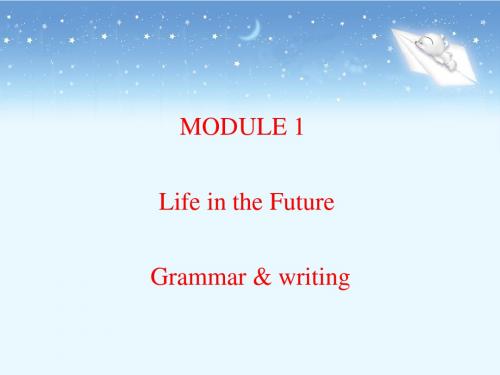
2. We _w__il_l_b_e_s_p_e_n_d_i_n_g_ more time in the bath. 3. Everyone _w__il_l_b_e_t_r_y_in_g_ hard to take care of the
Pronunciation The answer to the Ex. 1
Twenty years isn’t a long time. We won’t be living underground or in space. We’ll be living in houses and flats just as we do today.
I hope/I guess/I imagine/I’d like to
3. The introductory words: hopefully / eventually maybe / definitely
(get dressed). 3. They __w_o_n_’_t_b_e_w__o_rk_i_n_g__ (not work) next Thursday.
It’s a public holiday. 4. In the year 3000 a lot of people w__il_l_b_e_l_iv_i_n_g(live) on
Writing tips You should follow the instructions You have to use: 1. the future continuous tense
(I’ll be doing / I won’t be doing)
外研 高中英语必修4Module1Grammar(共25张PPT)_2

3. 表示婉转口气,表达有礼貌的询问或 请求。 e.g. Will you be having some tea? Will you be lending me your dictionary?
A. saves B. saved C. will save D. will have saved
7. In the near future, more advances in the robot technology ______ by scientists. A . are making B. are made C. will make D. will be make
8. By the time you have finished this book, your meal ______ cold.
A. gets
B. has got
C. will get D. is getting
9. — Can I call you back at two o’clock
this afternoon?
2. 用于代替一般将来时(多用于口语 中),使语言生动形象。用法如下: 1) 预料将要发生的动作或情况。 e.g. The train will be arriving soon. 2) 表示现已决定或安排将要做的事。 e.g. Doctor Smith will be giving another talk on family health at the same time next week.
3. 现在进行时表示一种经过考虑的、将 来要进行的动作; 而将来进行时通常 表示正常过程中可能会发生的动作, 因此将来进行时不如现在进行时那样 肯定,比后者偶然性要大一些
外研 高中英语必修4Module1Grammar(共25张PPT)
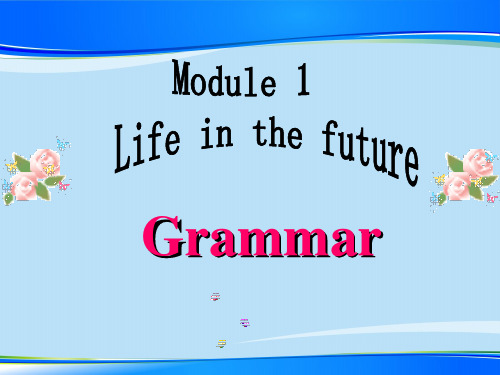
1. I like reading the novels ______ (write ) by Zhang Ailing. 2. The girl ______ (write) a letter in the study is my cousin. 3.There is something wrong with my car and I have to get it _______ (repair). 4. I want the doors of my new house ______ (paint) white. 5. There was a ________ (surprise) look on his face. 6. He was ______ (excite) at the good news. 7. The story was so ______ (move) that he was ______ (move) to tears.
过去分词作时间状语
When it is heated, ice will be changed into water.
=When heated, ice will be changed into water.
过去分词作条件状语
If I am compared with you, we still have a long way to go. =Compared with you, we still have a long way to go.
Task 2
T: Now please look at these two sentences: 1. I followed him to collect a hovering carriage driven by computer. = I followed him to collect a hovering carriage that /which was driven by computer. 2. Tomorrow you will be ready for some visits organized by the company. = Tomorrow you will be ready for some visits that/ which was organized by the company.
外研 高中英语必修4Module 1GrammarPPT课堂课件(38页)
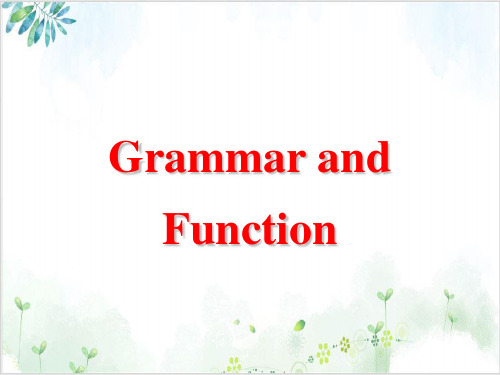
3. By this time tomorrow, I ____ on a beach in Hawaii, enjoying beautiful sunshine. A. am going to lie B. am lying C. will lie D. will be lying
3. years/ What/ will/ be/ job/ doing/ ten/ you/ in/ time? What will you be doing in ten years’ time?
Function: Talking about the future.
在英语中, 表达将要发生的动作或事 有不同的表达方式。如一般将来时、一 般现在时、现在进行时等。它们所表达 的意思有所不同。具体用法如下:
2. Ten years from now, people _w_i_ll_b__e_w_e_a_r_i_n_g_ (wear) smart clothes.
3. No one _w_i_ll_ ever _b_e_l_iv_i_n_g_ (live) on Mars.
4. Humans _w_i_ll_b_e__li_v_in_g_ (live) on another planet five billion years from now.
Grammar and Function
The future continuous (将来进行时): 将来进行时由“助动词shall/ will + be + 现 在分词”构成。shall用于第一人称单、复 数; will用于各种人称。美国英语中所有的 人称都用will。
外研版高一英语必修四:Module1grammar课件

C.am attending
D.will have attended
【解析】
考查时态的用法。句意为: —— 明天上午 9 :
00我给你打电话方便吗?——恐怕不行。我那时正在出席一个 会议。由时间状语at 9 o’clock tomorrow morning明天上午9 点,可知是将来某一时间正在进行的动作,故用将来进行时。 正确答案为B。
句意为:下星期这个时候,我将在度假。很
有可能我正躺在美丽的海滩上。从题意可以看出后面分句的
时间状语依然是This time next week,故用将来进行时。 【答案】 C
③—Is it convenient to you if I call you up at 9 o'clock tomorrow morning? —I'm afraid not. I________a meeting then. A.was attending B.will be attending
般带状语。
例句:Don’t call me up at ten o’clock in the evening.I
shall be sleeping then. 不要在晚上十点钟打电话来,那时我将在睡觉。 ②表示说话人感到某事即将发生或按计划预计要发生。 例句:What time will he be arriving at the airport? 他预计几点钟到达机场? ③表示现在正在进行的动作,但这个动作延续到将来。 例句:I wonder if it will still be raining this afternoon.
C.will be meeting
【解析】 行的动作。 【答案】 C
D.will have met
外研 高中英语必修4Module 1Grammar共38张

this time tomorrow, in two days,
D. shall be sleeping
Put the words in order and write
questions.
1. be/ in/ What/ future/ will/ the/ the/
world/ like? What will the world be like in the future?
2. Ten years from now, people
_w_i_ll_b_e__w_e_a_r_in_g__ (wear) smart clothes.
3. No one _w__il_l ever __b_e__li_v_in_g(live) on
Mars.
4. Humans _w_il_l_b_e_l_i_vi_n_g_ (live) on another planet five billion years from now.
university.
E I won't be here in twenty years.
F these predictions will come true if
technology continues to develop.
1 an intention
2 a future which you can “see” now
1. At this time tomorrow ______ over the Atlantic. A. we're going to B. we'll be flying C. we'll flying D. we're to fly
- 1、下载文档前请自行甄别文档内容的完整性,平台不提供额外的编辑、内容补充、找答案等附加服务。
- 2、"仅部分预览"的文档,不可在线预览部分如存在完整性等问题,可反馈申请退款(可完整预览的文档不适用该条件!)。
- 3、如文档侵犯您的权益,请联系客服反馈,我们会尽快为您处理(人工客服工作时间:9:00-18:30)。
Life in the Future Module 1Grammar温馨提示如果您在现甬本课件的过程中出砂字現象,请关闭所有幻灯片,重新打开可正常观看.Learning aims1. Learn about the basic usage of “the future continuous”.2. Learn about the “ways of referring to the future 二头 w Sc 女头Leading-inDoift forget to give it back to me!.别忘了把它还给我!'Hey, where are you、going? It's the wrong direction!嘿,你要去哪儿?方向错了!丄Future tensethe simple futuretense厂will / shall dobe going to dobe about to dobe doingbe to dodo / does表示安排,计划,航班,车,船等时刻表或 用于if ,when 等状语从句中代替will doFORMUSAGE will/shalldo表示将来发生的动作或出现的状态,或临时 决定。
shall 与第一人称连用 be goingto dobe doing表示主语计划打算的行动 或有征兆看来就要发生的事情 趋向动词,表示计划或安排好的动作 (go, come, leave, begin 等动词) be to do表示客观上计划或安排好的动作 be about表示即将发生的动作, to do一般不带时间副词或短语 do /does1/^will/shall+动词原形"(1)表示将来发生的动作或存在的状态,shall与第一人称连用o(2)有时可表示对将来的看法,假定或推测。
有时表示临时决定。
I think they will come back next week.我认为他们将在下周回来。
The predictions will come true if technology continues to develop.如果技术持续发展的话,这些预测会成为现实的。
(3)常和时间状语从句、条件状语从句连用。
If you overcook the meat it will be dry.你如果煮过头,肉会很干。
Your mother will be angry when she sees this mess. 当你母亲看到这混乱的局面时她会生气的。
(4)用于“祈使句+and+陈述句”中。
Go at once and you will see her.马上去,你就会见到她。
2.“be going to + 动词原形” 表示打算在最近或将来要做的事;或表示根据已有的迹象推测很可能要发生的事情。
Look! TVs going to rain.看!要下雨了。
They are going to stay for two days.他们打算待两天。
What are you going to do when you leave school? 你毕业后打算做什么?3 •—般现在时表将来(1) 一般现在时可以表示由于日历或时刻表的规定而固定不变的或比较不易变更的将来时间发生的动作。
(2)用于if, when等状语从句中代替will do oThe plane takes off at two pm.飞机将在下午两点钟起飞。
I will write to you as soon as I arrive there.我一到那儿就给你写信。
4. 现在进行时表将来现在进行时表示已经安排和已定好的计划尤其是时间和地点已经确定;也可指刚刚开始或马上就发生的动作,这一结构常用趋向动词,女口:come, leave, begin, start,arrive ,stay, return, take off, set off等动词及短语。
The plane is taking off.飞机就要起飞了。
I can,t go out tonight; my cousin is coming for dinner. 我今晚出不去了,我表弟要来吃晚饭。
We are setting off for America at 2:30 p.m“ 我们将在下午两点半动身去美国。
—Where are the boys? --------- 男孩们在哪儿呢?—They are coming. --------- 他们快到了。
5. be to do sth.表示“计划” “安排” “义务” “应该”?“可能” “命运”等。
Their daughter is to get married soon.他们的女儿就要结婚了。
;;;;;6. be about to do ... when...表示即将发生的动作,一般不带时间副词或短语。
;We are about to start when it began to rain.我们就要出发时,突然下起了雨。
将来进行时The Future Continuous一、定义以及构成将来进行时主要表示将来某一时间正在进行的动作,或表示要在将来某一时间开始,并继续下去的动作。
常用来表示礼貌的询问、请求等。
;;;将来进行时是由"shall/will + be +现在分词”构成的。
二、基本用法:1 •表示将来某一时间正在进行的动作,常与特定的时间状语连用。
(1) When he comes to my house tomorrow, I will be writing the report.明天他来我家的时候,我会在写报告。
;;;(2) We shall not be working this time next week・下周这个时候我们不在工作。
Tom will not be in London next Tuesday. He will be climbing in the Alps.Tom will be climbing in the Alps all next week.2.预测将来会发生的事情,安排即将发生或势必发生的动作,或表示将来的某种可能性。
(1)After you take the medicine, you will be feeling much better.吃了药,你就会觉得好多了。
;(2) 111 be taking my holidays soon.不久我将度假了。
3.表示亲切或委婉的请求。
(1) When shall we be meeting again? 我们什么时候能再见面呀?(2) l will be thinking of you.我会想你的。
三、与一般将来时的区别;将来进行时通常表示对将来事实的简单陈述,而 ' will+s (—般将来时)除表示时间概念外,还带有感情色彩。
将来进行时表示将来某时正在进行的动作,一般将来时表示将来某时将要发生的动作。
例如:;;;What will you be doing this time tomorrow?明天这个时候你会在做什么呢?;;; ; What will you do tomorrow?你明天做什么?【即学即练】用所给词的适当形式填空1.Hurry! The bus is coming (come).2・Don,t call me before seven am. I will be getting dressed (get dressed).3・They won't be working (not work) next Thursday.Ifs a public holiday.4.This time next year I will be lying (lie) on a beach.Class exercises1.(2015・天津高考)Jane can,t attend the meeting at3 o,clock this afternoon because she ___ a class that time.A.will teachB. would teachC.has taught —_ ^^^will be teaching2.(2015・湖南高考)As you go through this book, youthat each of the millions of people who lived through World War II had a different experience.B.foundfindC. had foundD.have found3. (2015・北京高考)一Dr. Jackson is not in his office at the moment.—All right. I ___ him later.硝will call B. have calledC.callD. will be calling4. (2013*江苏高考)一Could I use your car tomorrow morning?—Sure. I _______ a report at home・^will be writing B. will have writtenC. have writtenD. have been writingHomeworkGo over the grammar that we haveDifficult circumstances serve as a textbook of life for people.困难坎坷是人们生活的教科书。
